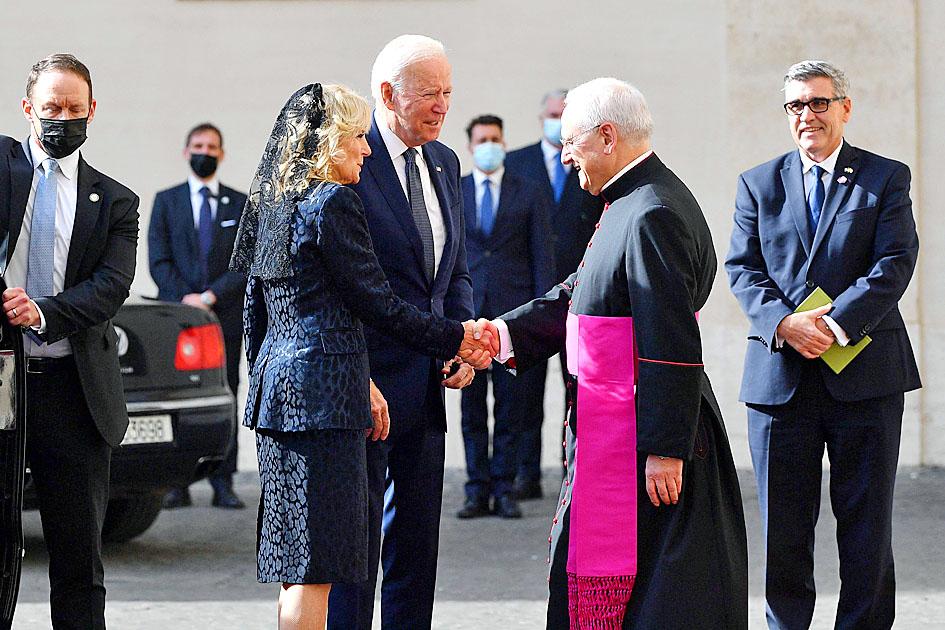Declaring that it is “good to be back,” US President Joe Biden yesterday opened a five-day European trip at the Vatican, where he and Pope Francis — the world’s two most prominent Catholics — planned to discuss the COVID-19 pandemic, climate change and poverty.
A dozen Swiss Guards in blue and gold striped uniforms stood at attention in the San Damaso courtyard for the arrival of Biden and his wife, Jill. They were received by Monsignor Leonardo Sapienza, who runs the papal household, and then greeted one by one the papal ushers, who lined up in the courtyard.
“It’s good to be back,” Biden said as he shook the hand of one of them.

Photo: AFP
“I’m Jill’s husband,” he told another before he was ushered into the Apostolic Palace and the pope’s private library.
The visit comes after a fitful day of talks over the fate of infrastructure and social spending bills that he cast as a choice between “leading the world, or letting the world pass us by.”
After visiting the Vatican, Biden is to stay for a G20 summit in Rome, before heading to Glasgow, Scotland, for a UN climate summit.
Biden is expected to be pressed to deliver concrete ideas for stopping a global pandemic, boosting economic growth and halting the acceleration of climate change at the G20 summit, titled “People, Planet, Prosperity.”
The slogan could also be a reflection of his promise to align US diplomacy with the interests of the middle class. This has tied any success abroad to his efforts to convince the US Congress to advance his environmental, tax, infrastructure and social policies.
It could be harder to get the world to commit to his stated goals if the US refuses to fully embrace them, one of the risks of Biden’s choice to knit together his domestic and foreign policies.
Before leaving Washington, Biden pitched Democrats in the US House of Representatives to support a scaled-back US$1.75 trillion “framework” that he believes could pass the evenly divided US Senate.
It remained to be seen whether US lawmakers would embrace the package or send Biden back to the negotiating table, as some key priorities such as paid family leave and lower prescription drug costs were excised from the bill.
“The rest of the world wonders whether we can function,” Biden told the lawmakers, according to a source familiar with his remarks.
House Speaker Nancy Pelosi invoked the trip as she tried to rally Democratic votes around the separate US$1 trillion infrastructure package, attempting, unsuccessfully, to build support for a vote on Thursday before Biden arrived in Rome.
“When the president gets off that plane, we want him to have a vote of confidence from this Congress,” she said.
While Biden was in the air, Pelosi, facing opposition from progressives, pulled the plug on a Thursday vote and instead set out to pass a short-term funding measure.

MORE VISITORS: The Tourism Administration said that it is seeing positive prospects in its efforts to expand the tourism market in North America and Europe Taiwan has been ranked as the cheapest place in the world to travel to this year, based on a list recommended by NerdWallet. The San Francisco-based personal finance company said that Taiwan topped the list of 16 nations it chose for budget travelers because US tourists do not need visas and travelers can easily have a good meal for less than US$10. A bus ride in Taipei costs just under US$0.50, while subway rides start at US$0.60, the firm said, adding that public transportation in Taiwan is easy to navigate. The firm also called Taiwan a “food lover’s paradise,” citing inexpensive breakfast stalls

TRADE: A mandatory declaration of origin for manufactured goods bound for the US is to take effect on May 7 to block China from exploiting Taiwan’s trade channels All products manufactured in Taiwan and exported to the US must include a signed declaration of origin starting on May 7, the Bureau of Foreign Trade announced yesterday. US President Donald Trump on April 2 imposed a 32 percent tariff on imports from Taiwan, but one week later announced a 90-day pause on its implementation. However, a universal 10 percent tariff was immediately applied to most imports from around the world. On April 12, the Trump administration further exempted computers, smartphones and semiconductors from the new tariffs. In response, President William Lai’s (賴清德) administration has introduced a series of countermeasures to support affected

CROSS-STRAIT: The vast majority of Taiwanese support maintaining the ‘status quo,’ while concern is rising about Beijing’s influence operations More than eight out of 10 Taiwanese reject Beijing’s “one country, two systems” framework for cross-strait relations, according to a survey released by the Mainland Affairs Council (MAC) on Thursday. The MAC’s latest quarterly survey found that 84.4 percent of respondents opposed Beijing’s “one country, two systems” formula for handling cross-strait relations — a figure consistent with past polling. Over the past three years, opposition to the framework has remained high, ranging from a low of 83.6 percent in April 2023 to a peak of 89.6 percent in April last year. In the most recent poll, 82.5 percent also rejected China’s

PLUGGING HOLES: The amendments would bring the legislation in line with systems found in other countries such as Japan and the US, Legislator Chen Kuan-ting said Democratic Progressive Party (DPP) Legislator Chen Kuan-ting (陳冠廷) has proposed amending national security legislation amid a spate of espionage cases. Potential gaps in security vetting procedures for personnel with access to sensitive information prompted him to propose the amendments, which would introduce changes to Article 14 of the Classified National Security Information Protection Act (國家機密保護法), Chen said yesterday. The proposal, which aims to enhance interagency vetting procedures and reduce the risk of classified information leaks, would establish a comprehensive security clearance system in Taiwan, he said. The amendment would require character and loyalty checks for civil servants and intelligence personnel prior to